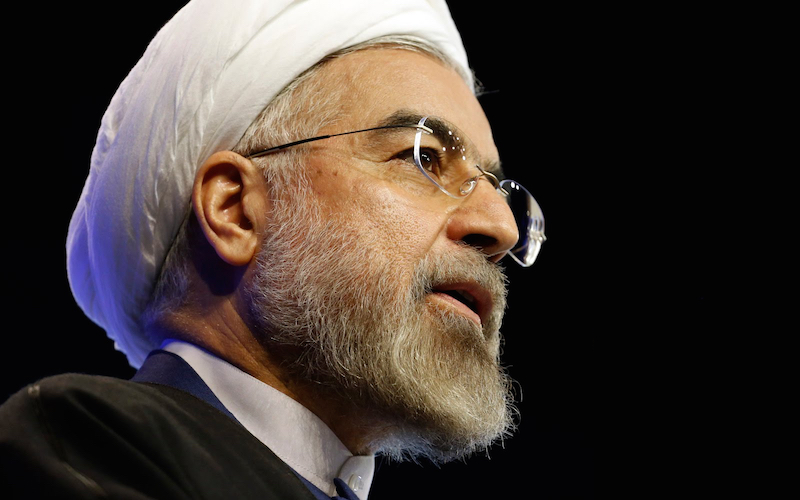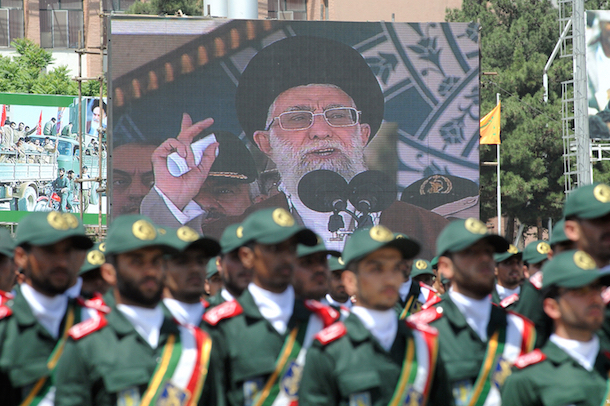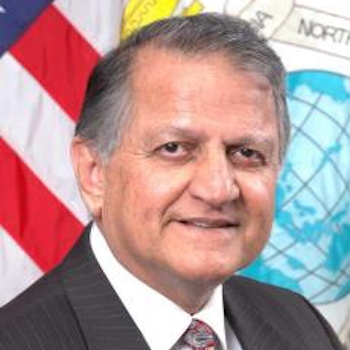
Is the ‘Dead’ Arab World Really Waiting to be Led by Iran?
The dearth of leadership inside the Arab world has created a sense of despair even among some of the best and the brightest of that region. One such intellectual is Boualem Sansal, who in a recent interview in the Israeli newspaper, Haaretz, spoke his mind quite candidly. In that interview, Sansal, after depicting the Arab world “in terms of history,” as “dead,” thinks that Iran “is well armed intellectually, scientifically and economically, and could one day lead Islam globally.” He is also of the view that “…soon the Sunni Arabs will accept the domination of Shi’ite Iran, because only Iran enjoys recognition from the West, and even instills fear in it.” He regards Iran’s nuclear program as “proof” of Iranian “capabilities.” He also regards “Western Islam” as a “serious rival” of Iran. Western Islam, in Sansal’s estimation, “too could one day compete for the right to lead the Muslim world.”
Sansal is an award-winning Arab writer, a philosopher, novelist, and a social critic, who resides in Algeria. His conclusions regarding the Arab world are a manifestation of his frustrations about the inability of the Arab polities to bring about democratic change. While one can understand his anguish, his conclusions about the death of the Arab world are quite wrong, and he is only partially right about his assessment of Iran.
The outburst of the Arab Awakening (aka the Arab Spring) in December 2010 has proven once and for all that the Arab world is politically and intellectually flourishing. The Arab Awakening managed to oust four of the longest serving dictators— Zain el Abideen Bin Ali of Tunisia, Muammar Qaddafi of Libya, Hosni Mubarak of Egypt, and Ali Abdullah Saleh of Yemen. Even though the Arab Spring was soon followed by a powerful blowback from the security state in Egypt, and transformation of Libya into pretty much a failed state, it also serves as a basis for hope that the next surge for change will likely be even more sweeping, in terms of its capacity to alter the turbid political status quo of that region.
Now, in a perverse way, the rise of the Islamic State (IS/ISIS/ISIL/Daish) serves as a warning to Arab rulers of the darkest possible political alternative that awaits them if they continue to insist on sustaining their rule.
They also know that their real option may not be to look away and pretend that IS will pose no threat to them, but to initiate a gradual transformation of their polities by introducing political reforms aimed at promoting democracy. In that regard, Tunisia continues to serve as a laboratory of what moderate political change might look like.
The main tragedy of the Sunni Arab world is that they have no ideal-type model of political change to emulate. Even the Tunisian promise of political moderation might fail largely because it is next door to a major failing state—Libya—where the Islamic State is also escalating its power and presence.
Even Shia Iran—Sansal’s ideal type—may not prove to be as promising as he envisions it to be. Iran is a state where the force of change, the Green Movement, has been defeated, but is not totally out of the picture. The greatest advantage that characterizes Iran, to quote that country’s famous reformist journalist, Akbar Ganji, is that it “…is not your usual authoritarian state. As a hybrid of religious dictatorship and competitive elections, the regime generates its own opposition, see-sawing back and forth between conservatives and reformists. One day, the balance of power will shift decisively toward democracy and against the Ayatollahs.”
Thus, Iran’s allowance of competitive elections—even when they are sometimes stolen by the Ayatollahs (as was the case in 2009) in favor of their favorite candidates—continues to serve as a promise that someday the forces of reform will have gained an upper-hand. In the meantime, the chief source of apprehension regarding the Islamic Republic is that, faced by the protests from the forces for change, the forces of reaction would overact, as they did in the aftermath of the elections of 2009, and might even attempt to drag their country too far in the direction of authoritarianism. Unfortunately, since no Arab state may be described as a “hybrid of religious dictatorship,” the only chance for political change is the repeat of what happened to the regimes in Libya and Egypt in 2011.
Such a proposition underscores the fact that the Arab world, contrary to the assertion of Boualem Sansal, is far from dead. The chances of further regime change in Yemen and Egypt are very much alive, while the struggle toward that end continues in Syria.
In Yemen, the Houthis—the Zaidi Shia minority group—have been fighting the pro-Saudi forces that support President Abdurrab Mansuor Hadi. The Yemeni civil war was further complicated by the emergence of the Islamic State—which aims to eclipse Al-Qaida on the Arabian Peninsula—and Saudi Arabia, which wants to bring Hadi back to power. Saudi Arabia and the Gulf states also accuse Iran of supporting the Shia Houthis. Even though the Yemeni civil war promises to be even bloodier in the coming months, no one can claim that the pro-Saudi order of restoring the rule of President Hadi is a done deal. The prospects of Yemen becoming a democracy even in the distant future are slim to none, but this also remains a country where Saudi Arabia might not be able to reestablish its previous hegemony and, along with it, implement its own version of obscurantist Islam.

In Syria, the United States and the Gulf States are involved in the struggle to oust Bashara Assad, while Russia and Iran are determined to keep him in power. What makes this situation very complicated is the fact that, even though all of these actors are also determined to eradicate the presence of the Islamic State—which has become a real power since early 2014 and occupies a large swathe of Syria and Iraq—they strongly disagree over the modalities of a political solution to the Syrian conflict that does not include Assad. Iran and Russia have also demonstrated their strong support of the Assad regime by investing considerable amounts of financial and military assets. The United States, on the contrary, has remained overly cautious regarding its willingness to support the anti-Assad Islamist groups, seriously doubting their commitment and allegiance to replacing Assad with a democratic state in Syria. Recently, the Obama administration’s entire policy of training a selected group of Islamists in Syria encountered a major setback when the American-aligned unit, known as Division 30, came under attack by the al-Qaida-affiliated Nusa Front.
As Russia and Iran remain resolute about safeguarding the Assad regime, any chance of regime change in Syria is going to emerge only as a result of political negotiations among the United States, Russia, and Iran. For both of these actors, their commitment to save the Assad regime is not cast in stone; they both might be amenable to a solution that would leave Assad in power over the Alawite-dominated portion. However, such a potential solution would also have to accept the transformation of Syria into a federation, a formula that has been kicked around in the West regarding Iraq for the past several years. No matter the specifics of the resolution of the Syrian conflict, the Arab world remains vibrant about the prospects of political change.
Egypt, the largest Arab state, is giving all indications that the current brutal regime of President Fattah al-Sisi is busy transforming itself into another Algeria of the early 1990s, when the military rulers of that country nullified the electoral victory of FIS (Islamic Salvation Front), outlawed it, and started a brutal nationwide campaign to “eradicate” that Islamist party. As a result, Algeria has established a shameful history of more than 200,000 civilian deaths, and the country appears to be waiting for another outburst of violence, especially when one considers the potential spillover effects of growing violence from neighboring Libya.
Unmindful of the historical similarities between what happened in Algeria and what is happening in Egypt, the Obama administration has accepted the prevalence of tyranny of the al-Sisi regime, which overthrew the democratically elected government of President Mohammad Morsi of the Muslim Brotherhood in July 2013. The United States has not only delivered eight F-16s to Egypt, but has also relaunched a “strategic dialogue” and agreed to resume “Bright Star,” an annual joint military exercise that was suspended after the military coup of 2013 in that country. Egypt is also plagued by violence in north Sinai by Ansar Bayt al-Maqdis, a terrorist entity that is affiliated with the Islamic State. As much as the military junta of Egypt continues to suppress Islamist-related protests and violence, chances are that the very same forces might bring about a bloody end to that regime. Such potential contradictors are propositions about the intellectual death of the Arab world.
Sansal is dead wrong in his assertion about any potential acceptance of the Arab states by the leadership of Iran. The Arab-Iran rivalry is not just a matter of theological differences between the Sunnis and the Shias. That rivalry is further complicated by the fact that Iran has definitely emerged as more of a vibrant challenger to the United States, while almost all Arab states accepted the dominance of that superpower in their region and have relied heavily on America’s military might for the sustenance of their rule. Iran has continued its anti-Americanism since the very inception of the Islamic Republic, while the United States has never ceased to look for opportunities—quite unsuccessfully—to bring about regime change in that country.
Two major military incursions of the United States in the aftermath of the 9/11 terrorist attacks on its territory—its invasion of Afghanistan in 2001 and that of Iraq in 2003—played wonderfully into the hands of the Ayatollahs. Iran’s two virulent enemies, the Taliban of Afghanistan and Saddam Hussein of Iraq, were removed from power. Iran fully exploited both of those opportunities, more in Iraq than in Afghanistan. Today, Iran remains the chief power broker in Iraq. Even after the reluctant decision of President Obama to station a small number of military advisors in Iraq, the internal war of Iraq involving the Islamic State is largely (and effectively) fought by Iranian-backed Shia militias. Even though the United States and Turkey have recently started to cooperate in their air war against the Islamic State, their campaigns have yet to produce any results in degrading the fighting capacity of the IS forces.
The US-Iran nuclear deal has the potential to open an era of rapprochement between Washington and Tehran; however, the domestic environment of neither country appears conducive to such potential. Iran seems to have adopted Henry Kissinger’s nuanced exercise of détente against the Soviet Union, whereby he sought cooperation on some issues while vigorously pursuing America’s interests in others, with little regard to how such behavior would affect détente on issues of cooperation. Similarly, while Iran has agreed to abide by the nuclear deal, it refuses to accept America’s dominance anywhere else; especially in the Levant, where it has shown no inclination to kowtow to the United States.
In the final analysis, the Arab-Iran rivalry will not likely be decided as a result of any one of those actor’s acceptance of one subservient role vis-à-vis another. That rivalry may only be resolved when both sides agree to treat each other with respect and amity on strategic issues of mutual interest while continuing to negotiate on issues where their interests diverge.

